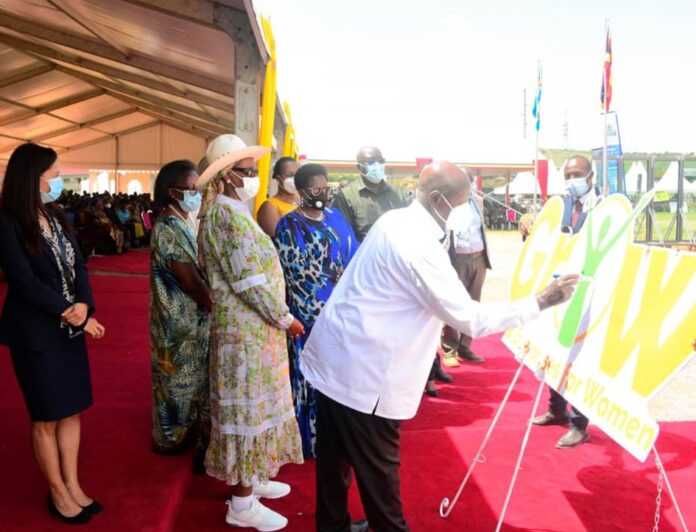
Kampala – Government has moved to address concerns over collateral requirements for women entrepreneurs seeking loans under the Generating Growth Opportunities and Productivity for Women Entrepreneurs (GROW) Project.
Launched in March 2023 by President Yoweri Museveni, the GROW Project
aims to empower female entrepreneurs by providing access to entrepreneurial services, including loans, training, and business support.The project targets women entrepreneurs transitioning from informal to formal businesses, with a focus on agricultural value chains, real estate, and trade.
The GROW Loan, a key component of the project, offers affordable credit to women entrepreneurs. The loan ranges from UGX 4 million to UGX 200 million, repayable within 24 months at an interest rate not exceeding 10.5% per annum. The GROW Loan is implemented in partnership with the Private Sector Foundation Uganda (PSFU) through the Participating Financial Institutions (PFIs).
While giving a status of implementation of the GROW project on Tuesday, Aggrey David Kibenge Permanent Secretary Ministry of Gender Labour and Social Development noted that many women have expressed interest in the GROW loan but lack the necessary collateral and cash flow to access the funds.
He emphasized that the GROW Loan is targeting women entrepreneurs who are making a transition from other existing government programs that provide micro-loans, such as the Parish Development Model (PDM), EMYOOGA, and the Uganda Women Entrepreneurship Program (UWEP), and now seek to grow and expand their businesses.
“….knowing that many women may not possess registered land, we negotiated with the participating commercial banks to broaden the securities accepted to include basic forms of security like unregistered land, movable household items and business assets,” said Kibenge.
He added, “Provision of security by those intending to borrow should not be seen as a limiting factor but rather a demonstration of commitment to repay the loan.
Kibenge also noted that some financial institutions are also accepting group and personal guarantees as a form of security for smaller loan values.
The GROW loan’s design requires participating financial institutions to bear the entire loan risk. This means that if a woman entrepreneur fails to repay the loan, the financial institution will absorb the credit losses. As a result, financial institutions will assess creditworthiness and lend to women entrepreneurs who can repay according to their credit assessment protocols. The GROW loan, therefore and in accordance with Bank of Uganda Regulations, requires appropriate collateral
“Key to note is that the financial institutions are required to pay back all the money advanced by government so that the GROW loan is sustained as a revolving fund that will be available to women entrepreneurs even beyond the life of the Project,” said Kibenge
Highlighted progress so far
The GROW Project has made significant progress since its launch. To date, 1,193 women entrepreneurs have benefited from the project’s loan component, with UGX 18.98 billion disbursed.
The loans are being offered through five participating commercial banks: Post Bank, Centenary Bank, Finance Trust Bank, DFCU Bank, and Equity Bank. Arrangements are also being finalized to bring Stanbic Bank on board.
In addition, Microfinance institutions and Savings and Credit Cooperatives will soon offer GROW loans, expanding access to women entrepreneurs across the country.
To access the GROW loan, interested women entrepreneurs can visit the Ministry of Gender, Labour and Social Development’s offices, contact the Private Sector Foundation Uganda GROW Office, or visit the participating financial institutions.
Government says all services, including loans and training, are provided free of charge. Women entrepreneurs are advised to report any instances of individuals demanding fees for GROW services.
The project has also provided technical skills training to 4,246 women entrepreneurs and their employees. Furthermore, agreements have been signed with various institutions to provide business support services such as business registration, standards certification, export licensing, and product development.

